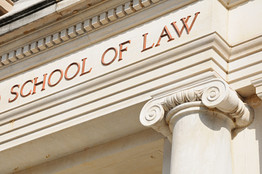 At this week’s annual meeting in Chicago, the American Bar Association’s Committee on Legal Education and Admission to the Bar will debate the question of whether or not non-United States Law Schools should be able to apply for ABA accreditation.
At this week’s annual meeting in Chicago, the American Bar Association’s Committee on Legal Education and Admission to the Bar will debate the question of whether or not non-United States Law Schools should be able to apply for ABA accreditation.
In the early 1920’s, the ABA, on its own incentive, began to accredit American law schools. Although ABA certification initially gave accredited law schools nothing more than a reputational boost, in the post-World War II period, a growing number of states decided to limit their bar examinations to graduates of ABA-approved law schools. Moreover, in 1952, the United States Department of Education certified the ABA as the nationally recognized accreditation authority for law schools. Today most states require law school graduates to be graduates of ABA-accredited law schools before they can take the state’s bar examination.
The American model of legal education has been highly influential around the world. Canadian law schools now operate on what is essentially an American model, and Australian schools have made significant moves in that direction. Moreover, entrepreneurs have established U.S.-style law schools in other countries where the ordinary model of legal education differs from that in the United States.
One such school is the Peking University School of Transnational Law in Shenzhen, China. The Peking law school was founded in 2007, with the intention of making it possible to obtain a U.S. style legal education in China. From the start, the school has been led by a former University of Michigan Law School dean, Jeffrey Lehman, who serves as dean and chancellor, and by Steven Yandle, formerly a long-time associate dean at the University of Virginia and Yale Law Schools.
The Peking School has adopted an American admissions model. Only students who possess a bachelor’s degree in a subject other than law are admitted to the law school, and all applicants must take the LSAT-STL, a variation of the LSAT. The law course does, however, last four years rather than three, and graduates receive both a J.M. degree (which qualifies them for practice in China) and a J.D. degree (authorized by the Chinese government, and designed to qualify them for practice in the United States). The school opened in the fall of 2008, with classes taught in both Chinese and English. All 53 of the school’s initial students were from mainland China. This first class graduated this past fall, and the fifth class will be admitted this fall.
The current ABA debate was prompted by the Peking University law school’s application for ABA accreditation in 2010. It is the first, and so far only, non-U.S. school to make such an application.
In 2010, an ABA Committee, appointed to consider the question, recommended that the ABA’s Council on Legal Education seriously consider extending its accreditation function to foreign law schools, so long as they were constructed on the U.S. model. However, in 2011, a second committee, which solicited public comments on the proposal, reached a contrary conclusion.
Persistent efforts on the part of the Peking law school have brought the issue back before the ABA for a third time in three years.
Advocates of expanded accreditation cite to the increased globalization of law practice and the value of such a system in determining which foreign lawyers are eligible for admission to the bar in the United States. Opponents emphasize the difficulty in administering such a system, the danger that it would stretch ABA financial resources too thin, and that it would lead to increased competition for American law students seeking jobs in a lawyer-saturated marketplace.

An interesting idea, which I think is a bad one. We seem to have a major growth in the number of law schools opening in the United States. Many colleges and universities have noticed that law schools are very inexpensive to open and operate, and they command high tuition for a law degree.
As a litigation attorney I have noticed a sad and slow decline in professionalism in my area of the law. I attribute this somewhat to an overpopulation of attorneys competing for business. As a result of the glut of attorneys, many are taking shortcuts that hurt their clients and our profession.
In my opinion adding more law schools is a bad idea for our profession, and allowing offshore law schools will not help professionalism either. Then comes the consideration regarding the quality of the education from an offshore law school. My tendency would be to agree with the ABA’s second committee, which has thus far not supported the idea of accrediting foreign law schools.
For the record, at the recent Annual Meeting of the American Bar Association, the ABA Council on Legal Education and Admission to the Bar voted overwhelmingly that it would NOT begin to accredit non-U.S. law schools.
It will be interesting to see what this will mean for schools like the new law school at Peking University.